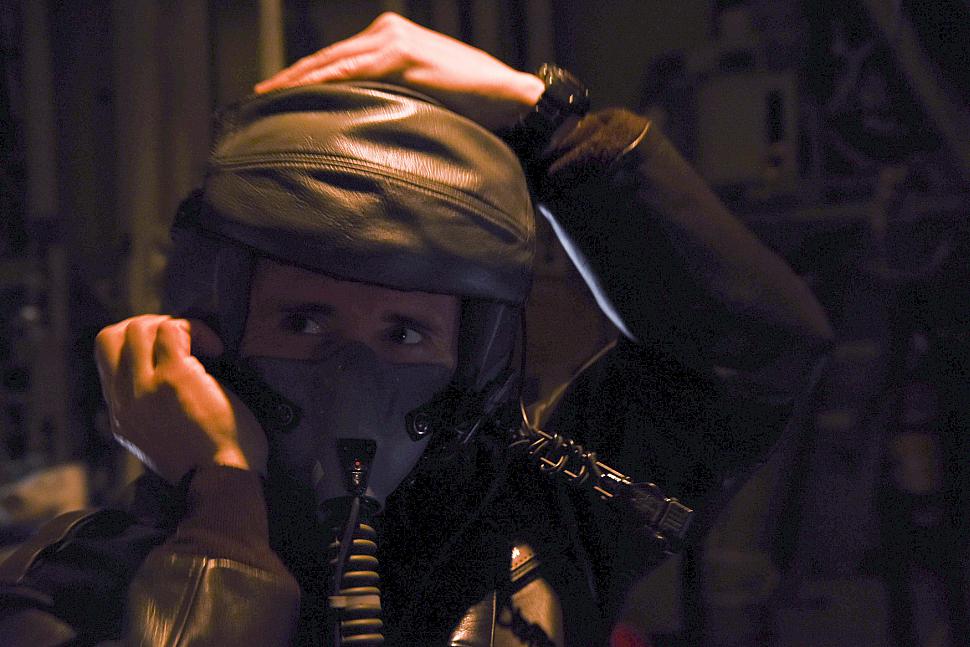C-130 News
C-130 Hercules News
C-130 tactical expertise starts at Little Rock
February 13, 2017 (by
SrA Stephanie Serrano) -
Throughout the Air Force, Airmen depend on each other to ensure the mission is completed. Just as pilots depend on an array of career field specialists to guarantee an aircraft is mission-ready, weapons undergraduate pilots in the C-130 Weapons Instructor Course depend on loadmasters to help understand what goes on in the back of the aircraft.

The 29th Weapons Squadron at Little Rock Air Force Base, Arkansas, is home to the C-130 WIC. Only the top tier of instructor pilots and instructor navigators are selected to attend the course. Weapons officer cadre train weapons undergraduate pilots, or WUGS, to become tactical experts and leaders in the art of battle-space dominance. This requires weapons officers to be well-rounded in all aspects of managing a C-130.
"My job entails anything from assisting students throughout multiple mission planning scenarios to flying as a loadmaster during the various WIC phases," said Staff Sgt. Jonathan Stager, 29th WPS instructor loadmaster. "We give [students] the information needed so they can plan accordingly when it comes to airdrops and transportation of cargo and personnel."
Trust and understanding are hallmark characteristics between pilots and loadmasters to ensure each mission is safely and accurately completed. Crew resource management, or CRM, plays a big factor in ensuring both pilot and loadmaster are aware of what’s going on and have clear communication within all phases of flight. CRM aids in the decision making process that takes place amongst each crewmember.
"It is critical to know what the loadmaster is doing through all phases of flight," said Capt. Scott Schavrien, 29th WPS weapons officer instructor. "Whether it comes to executing an airdrop, loading cargo or taking care of passengers, knowing what the loadmaster is doing ensures mission success."
Once the students graduate WIC, they are in charge of planning a vast multitude of complex missions. With the knowledge passed from cadre and loadmasters, weapons officers know exactly what an aircraft can do, what it can carry and how it can be used effectively and efficiently in all scenarios.
The purpose of WIC is to both teach pilots and navigators how to employ a C-130 in a cross-domain battlespace, as well as train their units which increases overall combat capability. Flying squadrons depend on their knowledge of the latest tactics, techniques and procedures for all air-to-air and air-to-ground combat in a joint environment.
SSgt. Jonathan Stager, 29th WPS instructor loadmaster, checks his oxygen mask and communication system during pre-flight procedures on February 3, 2017, at Little Rock AFB. [USAF photo by SrA Stephanie Serrano]
"My job entails anything from assisting students throughout multiple mission planning scenarios to flying as a loadmaster during the various WIC phases," said Staff Sgt. Jonathan Stager, 29th WPS instructor loadmaster. "We give [students] the information needed so they can plan accordingly when it comes to airdrops and transportation of cargo and personnel."
Trust and understanding are hallmark characteristics between pilots and loadmasters to ensure each mission is safely and accurately completed. Crew resource management, or CRM, plays a big factor in ensuring both pilot and loadmaster are aware of what’s going on and have clear communication within all phases of flight. CRM aids in the decision making process that takes place amongst each crewmember.
"It is critical to know what the loadmaster is doing through all phases of flight," said Capt. Scott Schavrien, 29th WPS weapons officer instructor. "Whether it comes to executing an airdrop, loading cargo or taking care of passengers, knowing what the loadmaster is doing ensures mission success."
Once the students graduate WIC, they are in charge of planning a vast multitude of complex missions. With the knowledge passed from cadre and loadmasters, weapons officers know exactly what an aircraft can do, what it can carry and how it can be used effectively and efficiently in all scenarios.
The purpose of WIC is to both teach pilots and navigators how to employ a C-130 in a cross-domain battlespace, as well as train their units which increases overall combat capability. Flying squadrons depend on their knowledge of the latest tactics, techniques and procedures for all air-to-air and air-to-ground combat in a joint environment.
Courtesy of 19th Airlift Wing Public Affairs
Related articles:
Forum discussion:
Tags
- Yokota receives last C-130H loadmaster (2016-07-17)
- C-130 Weapons Instructor Course celebrates 20 years (2016-07-01)
- The lives of C-130J loadmasters (2015-07-24)
- C-130 Fighting Falcon news archive
Forum discussion:
- Start a discussion about this article in the C-130.net forum.
Tags
Additional images:
SSgt. Jonathan Stager, center, 29th WPS instructor loadmaster, supervises MSgt. Leilani Mclimans, left, and MSgt. William Freshley, right, 29th WPS instructor loadmasters, as they perform the Air Drop Preparation Checklist on February 3, 2017, at Little Rock AFB. Loadmasters must fly every 45 days to remain certified. [USAF photo by SrA Stephanie Serrano]
